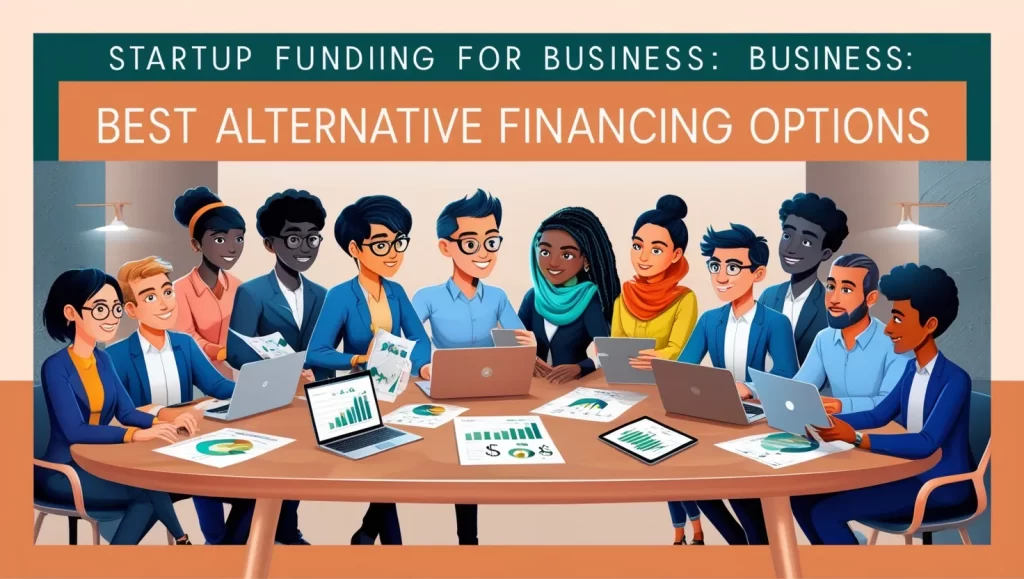Startup Funding for Business: Best Alternative Financing Options

Startup Funding for Business: Best Alternative Financing Options-For entrepreneurs looking to launch a new venture, securing startup funding for business is one of the most crucial steps. However, traditional financing options like venture capital and bank loans are not always accessible or suitable for every startup. Fortunately, the landscape of startup funding for business has evolved, offering a variety of alternative financing options that can help entrepreneurs take their businesses to the next level. In this article, we’ll explore the best alternative financing options for startups and how you can leverage them to secure the capital you need.
Why Consider Alternative Startup Funding for Business?
While traditional funding sources can be effective, they are often competitive and require businesses to meet stringent criteria. For many startups, particularly those in the early stages or in niche markets, alternative financing provides more flexibility, faster access to capital, and fewer restrictions.
The rise of alternative startup funding for business has democratized access to capital. Whether you’re a first-time founder or a seasoned entrepreneur, understanding these options is essential for securing the right financing for your business.
Crowdfunding: Tapping into the Power of the Crowd

Crowdfunding has become one of the most popular alternative funding options for startups. This method involves raising small amounts of money from a large number of people, typically through an online platform like Kickstarter, Indiegogo, or GoFundMe. Crowdfunding can be particularly beneficial for startups that offer consumer products or services that resonate with a broad audience.
Reward-Based Crowdfunding
In reward-based crowdfunding, backers contribute funds in exchange for rewards, such as early access to a product, branded merchandise, or exclusive experiences. This type of crowdfunding is ideal for entrepreneurs who have a product that can capture public interest. A successful crowdfunding campaign not only helps raise capital but also serves as a marketing tool, allowing you to gauge interest and build a community around your product before it’s even launched.
Equity Crowdfunding
Equity crowdfunding is a step beyond reward-based crowdfunding. In this model, investors contribute money in exchange for equity or shares in your company. This option is suitable for startups looking to raise more significant amounts of capital and willing to offer a stake in their business in return. Equity crowdfunding platforms like SeedInvest and Crowdcube make it easier for businesses to connect with a large pool of investors.
By tapping into the power of the crowd, startups can raise capital, increase visibility, and potentially attract a community of loyal customers and investors.
Peer-to-Peer (P2P) Lending: Borrowing from Individuals
Peer-to-peer (P2P) lending platforms, such as LendingClub and Funding Circle, have gained popularity as an alternative to traditional bank loans. These platforms connect borrowers (entrepreneurs) directly with lenders (investors) who are willing to provide capital in exchange for interest payments.
P2P lending is particularly attractive for startups that may not qualify for a bank loan but still have a solid business plan and growth potential. Since the loan approval process is generally faster and less restrictive than that of traditional financial institutions, P2P lending can provide quick access to capital, especially for early-stage companies.
In exchange for funding, entrepreneurs typically repay the loan with interest over a fixed period. However, it’s essential to evaluate the interest rates and terms to ensure that P2P lending is a cost-effective solution for your business. (Read More: How a Startup Business Line of Credit Can Fuel Your Growth in 2025)
Invoice Financing: Unlocking Cash Flow from Outstanding Invoices

For businesses that sell products or services on credit, invoice financing is a valuable tool for unlocking immediate cash flow. In this form of financing, a business sells its outstanding invoices to a third-party lender at a discounted rate in exchange for immediate payment. The lender then collects the payment directly from the customers when the invoice is due.
Invoice financing is ideal for startups that have a strong customer base but struggle with cash flow gaps due to slow-paying clients. This financing option allows businesses to access funds quickly without having to wait for invoices to be paid, enabling them to continue operating smoothly while managing growth.
This option can be particularly helpful for startups that don’t yet have access to traditional loans or other forms of financing, and it provides an alternative way to finance day-to-day operations.
Revenue-Based Financing: Flexible and Scalable Funding
Revenue-based financing (RBF) is an alternative funding model where investors provide capital in exchange for a percentage of your company’s future revenue. Unlike traditional loans, RBF doesn’t require entrepreneurs to give up equity or collateral. Instead, repayments are based on your company’s performance, meaning that the payment schedule is flexible and scales with your revenue.
This makes revenue-based financing an attractive option for startups that want to maintain control over their business but need capital to fuel growth. Because repayments are tied to revenue, businesses don’t face the pressure of fixed monthly payments, allowing them to focus on growing their operations.
Several RBF providers, such as Lighter Capital and Capify, offer tailored funding packages that match the needs and cash flow of your startup. (Read More: Expert Advice on Startup Business Funding Bad Credit Success Stories)
Bootstrapping: Funding Your Startup with Personal Capital
Bootstrapping refers to funding your startup using personal savings or revenue generated from early sales. While this method can be challenging, especially for businesses that require significant upfront investment, it gives entrepreneurs full control over their business without having to give away equity or take on debt.
Bootstrapping can be particularly appealing for founders who are hesitant to take on investors or lenders but have the personal resources to fund their startup. By keeping expenses lean and focusing on generating revenue as soon as possible, entrepreneurs can maintain ownership of their business and grow at their own pace.
However, bootstrapping does carry risks, as personal finances are often tied to the success of the business. It’s important to carefully assess your financial situation and determine if bootstrapping is a viable option for your startup’s growth.
Angel Investors: A Personal Touch to Startup Funding for Business
Angel investors are individuals who provide funding to startups in exchange for equity or convertible debt. Unlike venture capitalists, angel investors typically invest in early-stage businesses and may offer smaller amounts of capital. However, they often bring more than just money to the table—they can offer mentorship, industry connections, and valuable business advice.
Angel investors are typically more willing to take risks on startups than banks or venture capitalists. If you have a strong business idea and a promising team but lack access to traditional funding, an angel investor can be a great alternative. Platforms like AngelList and Gust help connect startups with angel investors actively looking for new opportunities.
Government Grants and Subsidies: Free Money for Your Startup
Government grants and subsidies are an attractive option for startups that meet specific criteria. Unlike loans or equity financing, grants don’t need to be repaid, which makes them one of the most favorable types of funding. Many governments offer grants to support innovation, research, technology development, and business expansion.
For startups in certain industries—such as clean energy, healthcare, or technology—there may be government-backed programs offering financial support. While the application process can be competitive and time-consuming, securing a government grant can provide significant financial relief and help accelerate your business’s growth. (Read More: Boosting Your Startup Company Success Rate: Lessons from Top Entrepreneurs)
The Role of Incubators and Accelerators in Startup Funding for Business

Startup incubators and accelerators offer both financial support and valuable resources, such as mentorship, networking opportunities, office space, and access to a community of like-minded entrepreneurs. Many of these programs provide seed funding in exchange for equity and help startups refine their business models, attract investors, and scale their operations.
Participating in an incubator or accelerator program can significantly increase your chances of securing startup funding for business, as these programs often have strong ties with investors and industry professionals. Prominent programs like Y Combinator, Techstars, and 500 Startups have helped countless startups successfully raise capital and launch their businesses.
Finding the Right Startup Funding for Business
As a startup, choosing the right funding option depends on your business model, growth stage, and industry. Alternative financing options like crowdfunding, P2P lending, and angel investors offer flexibility and access to capital that traditional funding sources may not provide. By exploring these alternatives and evaluating your business’s specific needs, you can secure the startup funding for business that will support your entrepreneurial journey and help you achieve long-term success.





